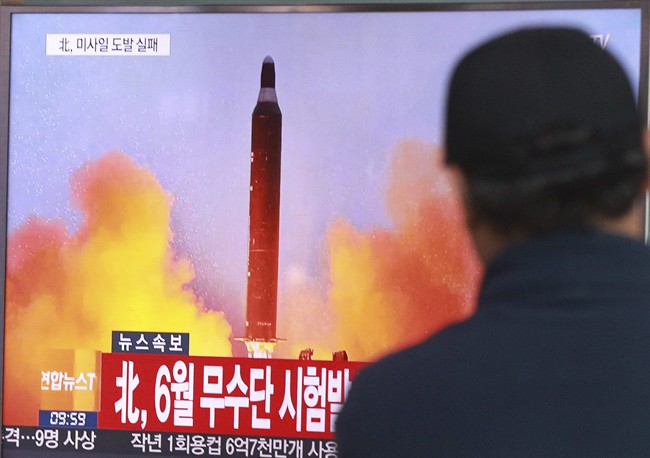SEOUL, Korea, Republic Of – South Korea and the U.S. said Sunday that the latest missile launch by North Korea ended in a failure after the projectile reportedly exploded soon after liftoff.

The South Korean Joint Chiefs of Staff said in a statement that the military believes the North unsuccessfully attempted to fire a mid-range Musudan missile. It said the failed launch was made near an airport in the North’s North Pyongan province.
READ MORE: South Korea has an assassination plan for Kim Jong Un: report
South Korea’s Yonhap news agency said that the missile was believed to have exploded soon after liftoff. Yonhap cited no source for this information.
South Korea strongly condemns the launch because it violates U.N. Security Council resolutions that bans any ballistic activities by North Korea, the statement said.
The U.S. military first reported the launch was attempted at 11:33 p.m. ET Friday (12:03 p.m. Saturday local time) and that the missile didn’t pose a threat to North America. The action brought harsh criticism from the U.S.
WATCH: Obama calls North Korea a ‘wasteland’ of industry, innovation

“We strongly condemn this and North Korea’s other recent missile tests, which violate U.N. Security Council Resolutions explicitly prohibiting North Korea’s launches using ballistic missile technology,” said Cmdr. Gary Ross, a Pentagon spokesman. He said the U.S. would raise concerns at the U.N.
“Our commitment to the defence of our allies, including the Republic of Korea and Japan, in the face of these threats, is ironclad,” Ross said. “We remain prepared to defend ourselves and our allies from any attack or provocation.”
Japan has expressed concern over the launches, and Defence Minister Tomomi Inada said Sunday that she wants to work in co-operation with the U.S. and South Korea to assure her country’s security.
North Korea has claimed technical breakthroughs in its goal of developing a long-range nuclear missile capable of reaching the continental United States. South Korean defence officials have said the North doesn’t yet have such a weapon.
READ MORE: Kim Jong Un keeps watch as North Korea runs another missile-related test
It’s the latest in a series of moves by North Korea aimed apparently at displaying a show of force. As recently as last month, it fired three ballistic missiles off its east coast, timed to get the attention of world leaders including President Barack Obama who were visiting the region for a series of summits. The U.N. Security Council subsequently condemned those North Korean launches and threatened “further significant measures” if it refused to stop its nuclear and missile tests.
North Korea also conducted its fifth nuclear test last month and in all has launched more than 20 ballistic missiles this year, part of its program aimed at improving the delivery system for nuclear weapons. Earlier this year, North Korea successfully launched a Musudan missile in June after several failed attempts.
Musudan has a range of 3,500 kilometres (2,180 miles) — enough to reach U.S. military installments in Japan and Guam.
Obama has vowed to work with the United Nations to tighten sanctions against North Korea, but has also said that the U.S. was still open to dialogue if the government changes course.
The U.S. strategy has largely centred on trying to get China, North Korea’s traditional ally, to use its influence to persuade the North to change course. North Korea is continuing missile test launches even as the U.N. Security Council is deliberating a further tightening of sanctions after the September nuclear test.
Previously in August, Japanese and South Korean officials said a medium-range ballistic missile flew about 1,000 kilometres (620 miles) and landed near Japan’s territorial waters.
___
Associated Press writers Josh Lederman in Washington and Ken Moritsugu in Tokyo contributed to this report.



Comments